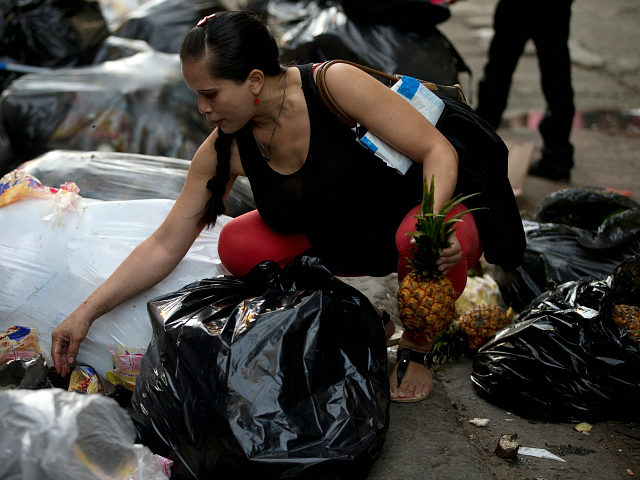A study finds that more than 2.4 million Venezuelans resort to eating garbage to survive, as video of this phenomenon surfaces – Venezuelans patiently waiting for markets to throw away their rotted produce and dig for anything remotely edible.
The video, published by the opposition website Dolar Today, shows throngs of people waiting behind markets for the daily refuse to be released. Once out, those waiting – many of them mothers who have no other recourse to feed their children – begin to dig through the items deemed too inedible to sell: half-rotted tomatoes, old lettuce, bags full of meat that butchers can no longer charge for:
“Before you could get food in stores,” explains one woman interviewed in the video, “but now everything is a line. … You spend four hours on a line and get nothing, so we have to come here and see if we can find at least a little something to eat.” She adds with concern, “Without food, how are we going to survive?”
Another woman explains the process of finding food in commercial waste: “We wait for them to throw out the scraps, and then we eat.” Stating that families are struggling particularly hard to feed their children, she notes, “We are dying of hunger,” adding, “I know children who are dying of hunger.”
One man in the crowd looking for food notes that, in addition to feeding themselves, some have made a business of finding the least objectionable garbage among the piles and reselling it to those unable to stomach rummaging through rotting food. “There are people who dedicate themselves to coming here, cleaning up the good things, and sell them for cheaper [than the market value],” he explains.
While no children speak to the camera in the video, Dolar Today explains that parents often send their children to dig through the garbage.
Dolar Today is an opposition website largely dedicated to publishing the black-market exchange rate of the bolívar, Venezuela’s currency. The real exchange rate is often significantly less favorable than the socialist government’s imposed rates, so many Venezuelans rely on the website to know the real value of their money. Venezuelan military veteran Gustavo Díaz runs the website from Alabama, where he works as a hardware salesman.
The Dolar Today video puts faces to a new study from Caracas’ Andrés Bello Catholic University (UCAB), which found that an estimated two-and-a-half million Venezuelans feed themselves by relying on food waste. The study found 8 percent of the population rely on garbage for their meals, while 35 percent of the country is mired in poverty. A study released in September by More Consulting found even larger numbers: 15 percent of Venezuelans were eating waste to survive, and 72 percent of Venezuelans were unable to secure three meals a day.
“Hunger and poverty became political problems long ago,” UCAB sociologist Luis Pedro España told the Argentine newspaper Clarín, echoing the lament of another man in the Dolar Today video: “We didn’t live like this under Chávez.”
While late dictator Hugo Chávez was a socialist, as well, current dictator Nicolás Maduro has imposed a ration system for food that prevented many from buying the goods they needed even when they could afford them, though few now can. Responding to the developing famine, Maduro has put the nation’s food supply under military control and established Soviet-style “distribution committees” that provide free food locally, which opponents contend are used to starve out opponents of the government.
Opposition leaders have used the famine as a rallying cry for change. “In Venezuela we eat garbage, let’s take the garbage out of power,” María Corina Machado, a former legislator violently ejected from her assembly seat, tweeted this week, calling for more protests and an end to Vatican-sponsored “peace” talks. The Democratic Unity Roundtable (MUD), the opposition group engaging in talks, and the Vatican have requested that other opposition leaders cooperate with the government as talks continue, a move Machado and other prominent opposition leaders have rejected.
“They want us not to do anything to affect the alleged dialogue … nothing that affects the hunger, the garbage, Maduro,” Machado railed last week, referring to a new timeline that would have stalled the opposition until January 13. “They want us to suffer another month of hunger in Venezuela?”
The famine has also caught the eye of some of Venezuela’s most prominent celebrities. Receiving a Grammy award in November, legendary singer-songwriter Ricardo Montaner said in his awards speech, “It is not such a good feeling to know that, while I am receiving a Grammy, there are people digging through garbage to eat today.” In a Facebook post following that speech, Montaner condemned the government’s maintaining of “over 100 political prisoners, some with over 1,000 days spent in captivity,” in addition to the problems of hunger and extreme poverty.
Maduro has responded to the famine by debuting a new radio program titled Salsa Time and joking that the famine is “Maduro’s diet. … It makes you hard, no need for Viagra!”

COMMENTS
Please let us know if you're having issues with commenting.